| Listing 1 - 10 of 22 | << page >> |
Sort by
|

ISBN: 014026616X Year: 1997 Publisher: London Penguin Books
Abstract | Keywords | Export | Availability | Bookmark
 Loading...
Loading...Choose an application
- Reference Manager
- EndNote
- RefWorks (Direct export to RefWorks)
Agricultural innovations --- Food supply --- Green Revolution --- Revolution, Green --- Agriculture --- Agriculture and state --- Grain
Book
ISBN: 9780801451331 9780801478024 9780801466106 0801466105 0801451337 0801478022 0801466083 1322503133 9780801466083 9781322503134 Year: 2012 Publisher: Ithaca, N.Y. : Comstock Pub. Associates/Cornell University Press,
Abstract | Keywords | Export | Availability | Bookmark
 Loading...
Loading...Choose an application
- Reference Manager
- EndNote
- RefWorks (Direct export to RefWorks)
Hunger is a daily reality for a billion people. More than six decades after the technological discoveries that led to the Green Revolution aimed at ending world hunger, regular food shortages, malnutrition, and poverty still plague vast swaths of the world. And with increasing food prices, climate change, resource inequality, and an ever-increasing global population, the future holds further challenges.In One Billion Hungry, Sir Gordon Conway, one of the world's foremost experts on global food needs, explains the many interrelated issues critical to our global food supply from the science of agricultural advances to the politics of food security. He expands the discussion begun in his influential The Doubly Green Revolution: Food for All in the Twenty-First Century, emphasizing the essential combination of increased food production, environmental stability, and poverty reduction necessary to end endemic hunger on our planet. Conway addresses a series of urgent questions about global hunger: • How we will feed a growing global population in the face of a wide range of adverse factors, including climate change? • What contributions can the social and natural sciences make in finding solutions?• And how can we engage both government and the private sector to apply these solutions and achieve significant impact in the lives of the poor?Conway succeeds in sharing his informed optimism about our collective ability to address these fundamental challenges if we use technology paired with sustainable practices and strategic planning.Beginning with a definition of hunger and how it is calculated, and moving through issues topically both detailed and comprehensive, each chapter focuses on specific challenges and solutions, ranging in scope from the farmer's daily life to the global movement of food, money, and ideas. Drawing on the latest scientific research and the results of projects around the world, Conway addresses the concepts and realities of our global food needs: the legacy of the Green Revolution; the impact of market forces on food availability; the promise and perils of genetically modified foods; agricultural innovation in regard to crops, livestock, pest control, soil, and water; and the need to both adapt to and slow the rate of climate change. One Billion Hungry will be welcomed by all readers seeking a multifaceted understanding of our global food supply, food security, international agricultural development, and sustainability.
Agricultural innovations --- Green Revolution --- Food supply --- Food security --- Social Sciences and Humanities. Development Studies --- Food Policy --- Food Security --- Food Security. --- Food deserts --- Food insecurity --- Insecurity, Food --- Security, Food --- Human security --- Revolution, Green --- Agriculture --- Agriculture and state --- Grain --- E-books
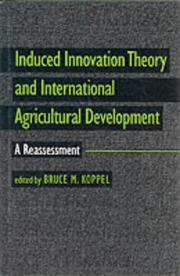
ISBN: 0801848911 Year: 1994 Publisher: Baltimore Johns Hopkins University Press
Abstract | Keywords | Export | Availability | Bookmark
 Loading...
Loading...Choose an application
- Reference Manager
- EndNote
- RefWorks (Direct export to RefWorks)
Green Revolution --- Groene Revolutie --- Revolution [Green ] --- Révolution verte --- Agricultural diversification --- Agricultural innovations --- Agriculture --- Food supply --- Green Revolution. --- Social Sciences and Humanities. Agricultural Economics --- Economic aspects --- Agricultural Policy. --- Developing countries --- Agricultural innovations - Developing countries. --- Agricultural diversification - Developing countries.
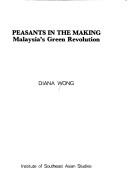
ISBN: 9814345547 997198864X Year: 1987 Publisher: Singapore : Institute of Southeast Asian Studies,
Abstract | Keywords | Export | Availability | Bookmark
 Loading...
Loading...Choose an application
- Reference Manager
- EndNote
- RefWorks (Direct export to RefWorks)
This study of the so-called "Green Revolution" in the rice bowl region of Malaysia aims to provide an interpretation of recent changes in the Malaysian agrarian structure, and to make an analytical and theoretical contribution to the long-standing intellectual debate on the "agrarian question". By joining the micro-world of household social structure and economy to the macro-world of changes in production relations, it traces out a specific trajectory of agrarian development in Malaysia.
Peasants --- Green Revolution --- Agriculture --- Farming --- Husbandry --- Industrial arts --- Life sciences --- Food supply --- Land use, Rural --- Revolution, Green --- Agricultural innovations --- Agriculture and state --- Grain --- Peasantry --- Agricultural laborers --- Rural population --- Marks (Medieval land tenure) --- Villeinage --- Economic aspects --- Muda Irrigation Scheme (Malaysia)
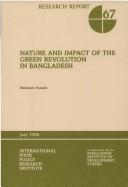
ISBN: 0896290700 Year: 1988 Publisher: Washington, D.C. IFPRI
Abstract | Keywords | Export | Availability | Bookmark
 Loading...
Loading...Choose an application
- Reference Manager
- EndNote
- RefWorks (Direct export to RefWorks)
Zonder onderwerpscode: wereldeconomie, ontwikkelingsproblematiek --- 664 <549.3> --- 641 <549.3> --- Agricultural innovations --- -Agriculture --- -Green Revolution --- -Revolution, Green --- Agriculture --- Agriculture and state --- Food supply --- Grain --- Farming --- Husbandry --- Industrial arts --- Life sciences --- Land use, Rural --- Innovations, Agricultural --- Technological change in agriculture --- Technological innovations --- Production and preservation of solid foodstuffs--Oost-Pakistan. Bangladesh --- Voeding. Voedsel--(zie ook {392.8})--Oost-Pakistan. Bangladesh --- Economic aspects --- -Economic aspects --- -Innovations --- Technology transfer --- Green Revolution --- -Production and preservation of solid foodstuffs--Oost-Pakistan. Bangladesh --- -664 <549.3> --- 664 <549.3> Production and preservation of solid foodstuffs--Oost-Pakistan. Bangladesh --- Revolution, Green --- Innovations
Book
ISBN: 9048125413 9786613470034 1283470039 904812543X Year: 2011 Publisher: Dordrecht : Springer,
Abstract | Keywords | Export | Availability | Bookmark
 Loading...
Loading...Choose an application
- Reference Manager
- EndNote
- RefWorks (Direct export to RefWorks)
Africa urgently needs a uniquely African Green Revolution- a revolution that is long overdue, a revolution that will help the continent in its quest for dignity and peace Mr. Kofi Annan, Former Secretary General of the United Nations (UN), currently the Board Chair of Alliance for a Green Revolution in Africa (AGRA) Research work on soil in Sub-Saharan Africa (SSA) has generated numerous outputs but very few have been translated into adoption to improve the livelihoods of the smallholder farmers. This is the greatest challenge Africa needs to address in order to achieve the highly sought after green revolution Andre Bationo Soil Health Specialist, Alliance for a Green Revolution in Africa (AGRA), Accra, Ghana An African Green Revolution can apply the power of knowledge and technology with an environmental touch: disseminating many crop varieties that will thrive in diverse conditions; improving soil health through integrated soil fertility management; and developing technologies that maximize the use of rainwater, deliver small-scale irrigation and mitigate against impacts of unfavourable and changing climatic conditions.
Green Revolution -- Africa -- Congresses. --- Soil fertility -- Africa -- Congresses. --- Agriculture --- Earth & Environmental Sciences --- Agriculture - General --- Green Revolution --- Revolution, Green --- Life sciences. --- Agriculture. --- Life Sciences. --- Life Sciences, general. --- Agricultural innovations --- Agriculture and state --- Food supply --- Grain --- Biosciences --- Sciences, Life --- Science --- Farming --- Husbandry --- Industrial arts --- Life sciences --- Land use, Rural

ISBN: 0801486106 Year: 1998 Publisher: Ithaca (N.Y.). Cornell university press
Abstract | Keywords | Export | Availability | Bookmark
 Loading...
Loading...Choose an application
- Reference Manager
- EndNote
- RefWorks (Direct export to RefWorks)
Agricultural innovations --- Food supply --- Green Revolution --- 579.67 --- 338.439 --- Food microbiology --- Economie van de voedselproductie. Economie van de voedingsindustrie. --- 338.439 Economie van de voedselproductie. Economie van de voedingsindustrie. --- 579.67 Food microbiology --- Revolution, Green --- Agriculture --- Agriculture and state --- Grain --- Economie van de voedselproductie. Economie van de voedingsindustrie
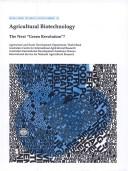
ISBN: 0821317415 Year: 1990 Publisher: Washington : The World Bank,
Abstract | Keywords | Export | Availability | Bookmark
 Loading...
Loading...Choose an application
- Reference Manager
- EndNote
- RefWorks (Direct export to RefWorks)
Agricultural biotechnology --- Agricultural innovations --- Green Revolution --- #ABIB:atte --- 66.098 --- 66.098 Biological processes. Biotechnology --- Biological processes. Biotechnology --- Revolution, Green --- Agriculture --- Agriculture and state --- Food supply --- Grain --- Innovations, Agricultural --- Technological change in agriculture --- Technological innovations --- Agro-biotechnology --- Biotechnology --- Congresses --- Economic aspects&delete& --- Social aspects&delete& --- Innovations --- Technology transfer --- Economic aspects --- Social aspects
Book
ISBN: 9780231546751 0231546750 9780231186667 9780231186674 0231186665 9780231186667 0231186673 9780231186674 Year: 2018 Publisher: New York, NY : Columbia University Press,
Abstract | Keywords | Export | Availability | Bookmark
 Loading...
Loading...Choose an application
- Reference Manager
- EndNote
- RefWorks (Direct export to RefWorks)
China’s dismantling of the Mao-era rural commune system and return to individual household farming under Deng Xiaoping has been seen as a successful turn away from a misguided social experiment and a rejection of the disastrous policies that produced widespread famine. In this revisionist study, Joshua Eisenman marshals previously inaccessible data to overturn this narrative, showing that the commune modernized agriculture, increased productivity, and spurred an agricultural green revolution that laid the foundation for China’s future rapid growth.Red China’s Green Revolution tells the story of the commune’s origins, evolution, and downfall, demonstrating its role in China’s economic ascendance. After 1970, the commune emerged as a hybrid institution, including both collective and private elements, with a high degree of local control over economic decision but almost no say over political ones. It had an integrated agricultural research and extension system that promoted agricultural modernization and collectively owned local enterprises and small factories that spread rural industrialization. The commune transmitted Mao’s collectivist ideology and enforced collective isolation so it could overwork and underpay its households. Eisenman argues that the commune was eliminated not because it was unproductive, but because it was politically undesirable: it was the post-Mao leadership led by Deng Xiaoping—not rural residents—who chose to abandon the commune in order to consolidate their control over China. Based on detailed and systematic national, provincial, and county-level data, as well as interviews with agricultural experts and former commune members, Red China’s Green Revolution is a comprehensive historical and social scientific analysis that fundamentally challenges our understanding of recent Chinese economic history.
Green Revolution --- Communes (China) --- Agriculture --- Agriculture and state --- S10/0525 --- S20/0720 --- Revolution, Green --- Agricultural innovations --- Food supply --- Grain --- People's communes (China) --- Ren min gong she (China) --- Renmin gongshe (China) --- Economic aspects --- China: Economics, industry and commerce--Rural industry --- China: Agriculture forestry, fishery, natural disasters--Communes (agrarian aspects) --- E-books
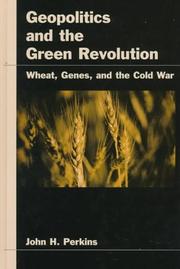
ISBN: 0195110137 9786610453290 1423759559 0195355032 128045329X 1602561575 0197561063 9781423759553 9781602561571 9780195355031 9781280453298 9780195110135 Year: 2020 Publisher: New York : Oxford University Press,
Abstract | Keywords | Export | Availability | Bookmark
 Loading...
Loading...Choose an application
- Reference Manager
- EndNote
- RefWorks (Direct export to RefWorks)
'Geopolitics and the Green Revolution' explores why four different countries (USA, India, Britain and Mexico) each sought to develop high-yielding wheat production. National security concerns and management of foreign exchange were prime motivators of the new technologies, a relationship that has not been previously developed in studies of agricultural modernization. Future reform efforts in agriculture will be affected by this history.
International relations. Foreign policy --- World history --- anno 1900-1999 --- Blé --- Blé--Commerce --- Breadstuffs --- Cold War --- Commerce du blé --- Cultivated wheats --- Green Revolution --- Groene Revolutie --- Guerre froide --- Koude oorlog --- National security --- Nationale veiligheid --- Oorlog [Koude ] --- Revolution [Green ] --- Révolution verte --- Security [National ] --- Spring wheat --- Sécurité nationale --- Tarwe --- Tarwehandel --- Triticum --- Triticum aestivum --- Triticum sativum --- Triticum vulgare --- Veiligheid [Nationale ] --- Wheat --- Wheat trade --- Wheats [Cultivated ] --- Cold War. --- Green Revolution. --- National security. --- Wheat. --- Wheat - Breeding. --- Wheat trade. --- Plant Sciences --- Agriculture --- Earth & Environmental Sciences --- Breeding --- Government policy --- Government policy. --- Breeding. --- Wheats, Cultivated --- Wheat industry --- National security policy --- NSP (National security policy) --- Security policy, National --- Revolution, Green --- Grasses --- Grain trade --- Economic policy --- International relations --- Military policy --- Agricultural innovations --- Agriculture and state --- Food supply --- Grain --- World politics --- Breeding, --- Breeding&delete& --- E-books --- Kweken --- Wheat - Breeding - Government policy.
| Listing 1 - 10 of 22 | << page >> |
Sort by
|

 Search
Search Feedback
Feedback About UniCat
About UniCat  Help
Help News
News